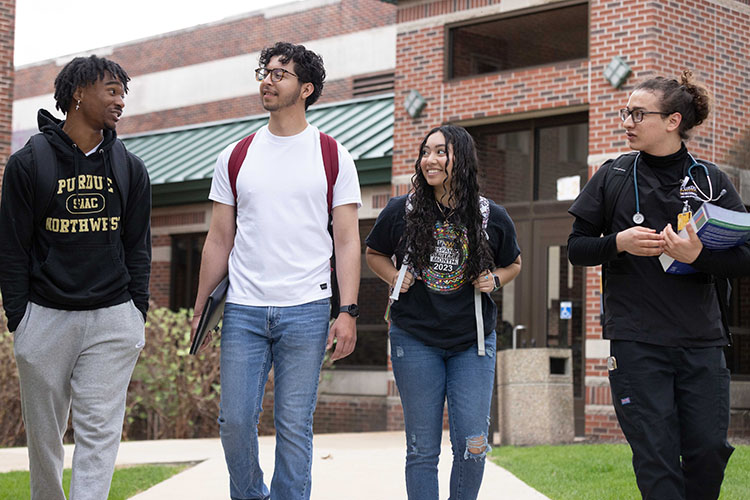Frequently Asked Questions
Find information about the classes, benefits and requirements of the Honors College at Purdue University Northwest.
In This Section
Why Honors College?
By joining the Honors College, you’re investing in your personal, professional, and academic growth! Honors Students are part of a caring community on campus – they even have a peer mentor their first semester!
Honors College students attend special honors-only events throughout the semester and participate in volunteering and civic engagement activities. Honors College students also get individualized academic advising, unique research opportunities, specialized classes, and first day priority registration.
The Honors College provides multidisciplinary learning opportunities and engaging academic opportunities to students from all majors! Our curriculum can be completed within your existing plan of study, and our leadership opportunities help you develop important life-long skills.
Our students represent diverse backgrounds, perspectives, and experiences within the larger PNW community, and they challenge themselves to succeed academically, personally, and in their community.
Students who complete their academic, service, and participation requirements each year are given a gold seal on their diploma and a notation on their official transcript when they graduate.
Our students have gone on to graduate study at places such as University of Chicago, the University of Notre Dame, Northwestern University, Indiana University, Purdue West Lafayette, and right here at PNW! Regardless of their next steps, our Honors College students develop strong critical thinking, research, and leadership skills that are an asset in any career field or further education.

About Honors College
Absolutely! Our Honors team will work with you to create an adapted curriculum to meet your needs.
Not necessarily! With proactive planning and coordination with your Honors advisor, our curriculum can be adapted to any major.
Through engaging in research and leadership opportunities within the Honors College, you can build a great resume to support your graduate school application!
Our Honors College team is here to help you through your academic journey at PNW and beyond.
Of course! Reach out to us at honors@pnw.edu and our team would be happy to chat.
Honors College Coursework
Every student is different, so it’s hard to say what ‘easier’ or ‘harder’ really means! But Honors classes aren’t designed to be more work than other classes.
You’ll find that the style of instruction is likely to be more discussion-focused and you may be expected to participate more. Your critical thinking skills will be honed through intentional assignments and activities.
Because you’ll be taking these classes with other honors students from all majors, the class discussion can be lively and exciting – you may learn as much from your classmates as your professor!
We recommend our Honors College students focus on completing 3 honors credits a semester, which is typically one class or one stacked course research project each semester.
Not necessarily! With proactive planning and coordination with your Honors advisor, our curriculum can be adapted to any major.
Yes! We have many students who double-major and/or add minors to their degree.

Leadership Requirements
Community Service opportunities and events are posted on the Honors College online course throughout the year.
By joining the Honors College, you are required to complete 20 hours of community service each academic year.
Community service is more than just a requirement for Honors College students or a line on a resume. It is a transformative experience that shapes the education of our students and contributes to the development, betterment, and growth of our local communities.
Honors College students are required to attend at least two events per semester.
Attending events can help students build community, develop social skills, and interact with their peers.
Each year, the Honors College has a 5K walk to benefit a local not-for-profit organization. Every student is required to participate in this walk. Participation can include walking, setting up and break down the event and working the check-in table.
Being philanthropic develops empathy and broadens our perspective of the world. It provides opportunities for education, relief, growth and success that may never be available otherwise.
